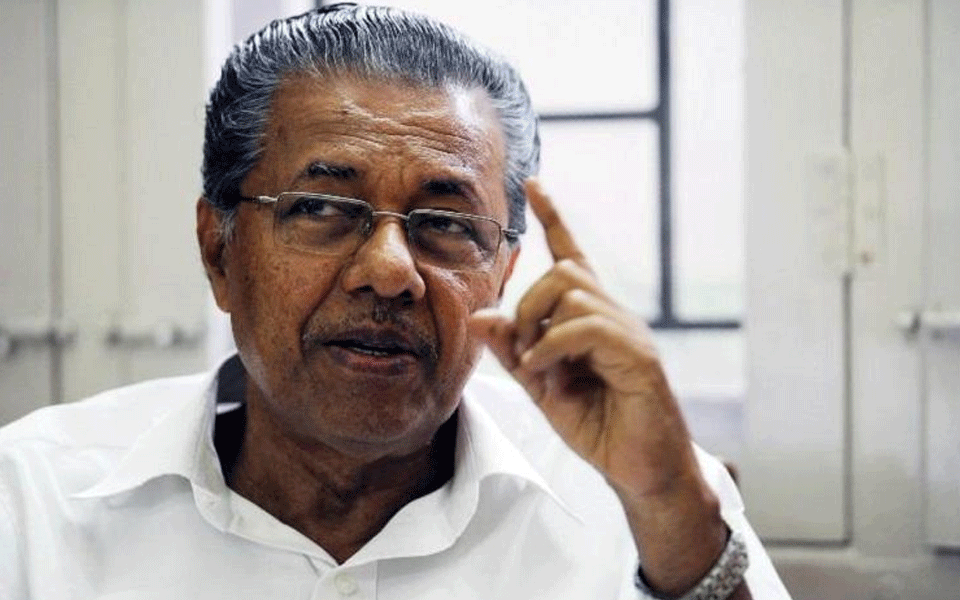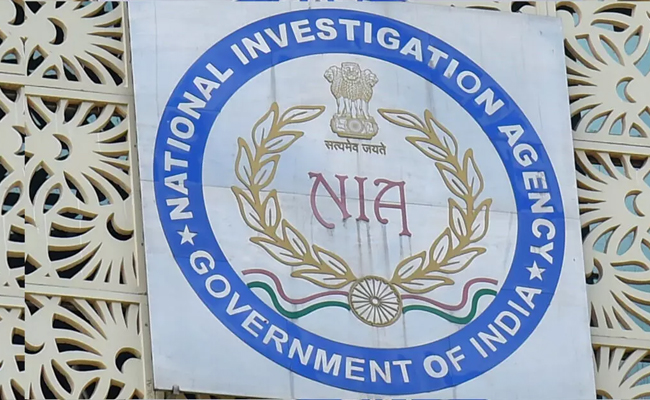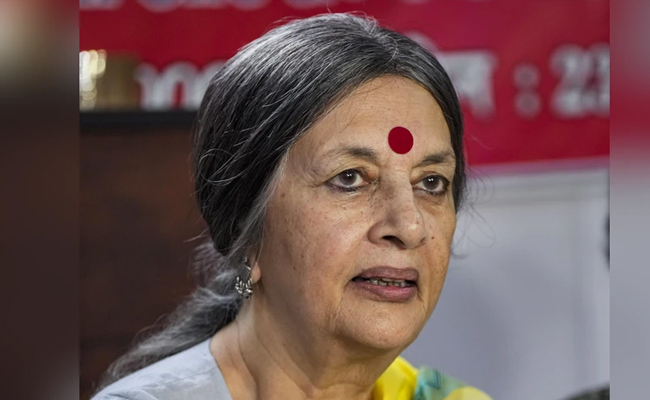Thiruvananthapuram, Nov 7: A controversy has broken out in Kerala over erasing of a new wall painting at a railway station depicting the 1921 wagon tragedy as part of "Mappila (Muslims) rebellion" with Chief Minister Pinarayi Vijayan Wednesday alleging that the Sangh Parivar was behind it.
Describing the erasing of the painting at Tirur station as "extremely heinous", he claimed it was an 'insult' to the country's freedom struggle.
"Indian Railways, which is a PSU, has succumbed to Sangh Parivar's interests and erased the painting", Vijayan alleged in a Facebook post.
When contacted, Railway sources denied the charge and said it was painted over in view of calls from various people criticising the subject chosen for the mural under a beautification programme.
It was perceived to be not in accordance with the beautification plan of the railways, since it depicted a "tragic event", the sources said.
The painting was half way through when a fresh coat of paint was applied over it on directions from officials of the Palakkad Railway Division to restore the wall to its original state, they added.
BJP state general secretary A N Radhakrishnan termed the railway's decision as a 'welcome step' but said his party had no role in it.
"BJP has nothing to do with the decision. As far as I have understood, the Railways have taken a stand against demonstration of communal violence," he told PTI.
The objection raised by local people might have persuaded them to take such a stand, he added.
The wagon tragedy took place on Nov 21, 1921 when 67 prisoners from the Malabar region, arrested for participating in the Mappila Rebellion against the British rule, died of suffocation while being brought to Tirur in a windowless wagon of a train.
Vijayan said the erasing of the painting was "an insult to the history of Indian Freedom struggle and can only be viewed as an anti-national act".
Using their power at the centre and various states, the RSS was attempting to 'distort' and 're-write' history of the country's freedom struggle, he said.
Now they were "allergic" to hear about the freedom struggle, Vijayan said alleging that whenever the RSS got an opportunity, it had 'slogged' for the Britishers.
"It is not surprising that these type of people are scared to think of the 'golden milestones' of the history of the freedom struggle," he added.
Besides Tirur, Kannur and Palakkad stations in the division had been chosen for beautification works with paintings of art, culture and historical events.
Let the Truth be known. If you read VB and like VB, please be a VB Supporter and Help us deliver the Truth to one and all.
Mumbai (PTI): In view of Argentine superstar footballer Lionel Messi's visit to Mumbai on Sunday, the city police are implementing stringent security measures, like not allowing water bottles, metals, coins inside the stadiums and setting up watchtowers to keep an eye on the crowd, officials said.
The police also said taking extra care to avoid any stampede-like situation and to prevent recurrence of the chaotic situation that unfolded in Kolkata during Messi's visit on Saturday as thousands of fans protested inside the Salt Lake stadium here after failing to catch a clear glimpse of the football icon despite paying hefty sums for tickets.
Messi is expected to be present at the Cricket Club of India (Brabourne Stadium) in Mumbai on Sunday for a Padel GOAT Cup event followed by attending a celebrity football match. He is expected to proceed to the Wankhede Stadium for the GOAT India Tour main event around 5 pm.
"In view of Lionel Messi's visit to Mumbai, the police are geared up and have put in place a high level of security arrangements in and around the stadiums located in south Mumbai. Considering the chaos that prevailed in Kolkata and the security breach, we have deployed World Cup-level security arrangements at Brabourne and Wankhede stadiums," an official said.
Expecting heavy crowd near the stadiums during Messi's visit, the city police force has deployed more than 2,000 of its personnel near and around both the venues, he said.
As the Mumbai police have the experience of security 'bandobast' during the victory parade of ICC World Cup-winning Indian team and World Cup final match at the Wankhede Stadium, in which over one lakh cricket fans had gathered, we are prepared to handle a large crowd of fans, he said.
"We are trying to avoid the errors that occurred in the past," the official said.
There is no place to sneak inside the stadiums in Mumbai like the Kolkata stadium, according to him.
The police are also asking the organisers to provide all the required facilities to the fans inside the stadium, so that there will be no chaos, he said, adding the spectators have purchased tickets in the range of Rs 5,000 to 25,000. After paying so much of amount, any spectator expects proper services, while enjoying the event, he said.
The police are expecting 33,000 spectators at the Wankhede Stadium and over 4,000 at Brabourne Stadium. Besides this, more than 30,000 people are expected outside and around the stadiums just to have a glimpse of the football sensation, he said.
The organisers responsible for Messi's India visit recently came to Mumbai to discuss security arrangements. During the meeting, the Mumbai police asked them not to take the event lightly, according to the official.
After those requirements were fulfilled, the final security deployment was chalked out, he said.
Police has the standard procedure of the security arrangements inside the Wankhede Stadium, where people are barred from taking water bottles, metals objects, coins. Police are setting up watch towers near the stadiums and there will be traffic diversions, so that there is maximum space available to stand, according to the official.
Police are also appealing to the spectators to use public transport service for commuting and avoid personal vehicles to reach south Mumbai.
To avoid any stampede-like situation, police are also taking precautionary measures and will stop the fans some distance ahead of the stadium and public announcement systems will be used to guide the crowd. Barricades will be placed at various places to manage the crowd.
In case the crowd swells up beyond expectation, the police will divert people to other grounds and preparations in this regard underway, he said.
Additional police force has been deployed in south Mumbai to tackle any kind of situation, he said.





